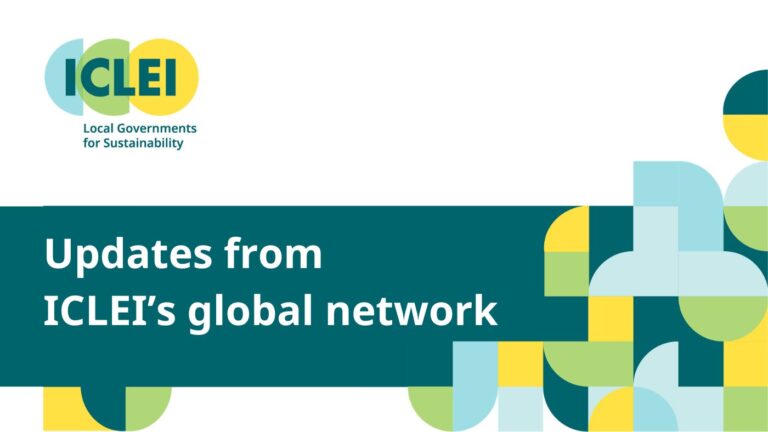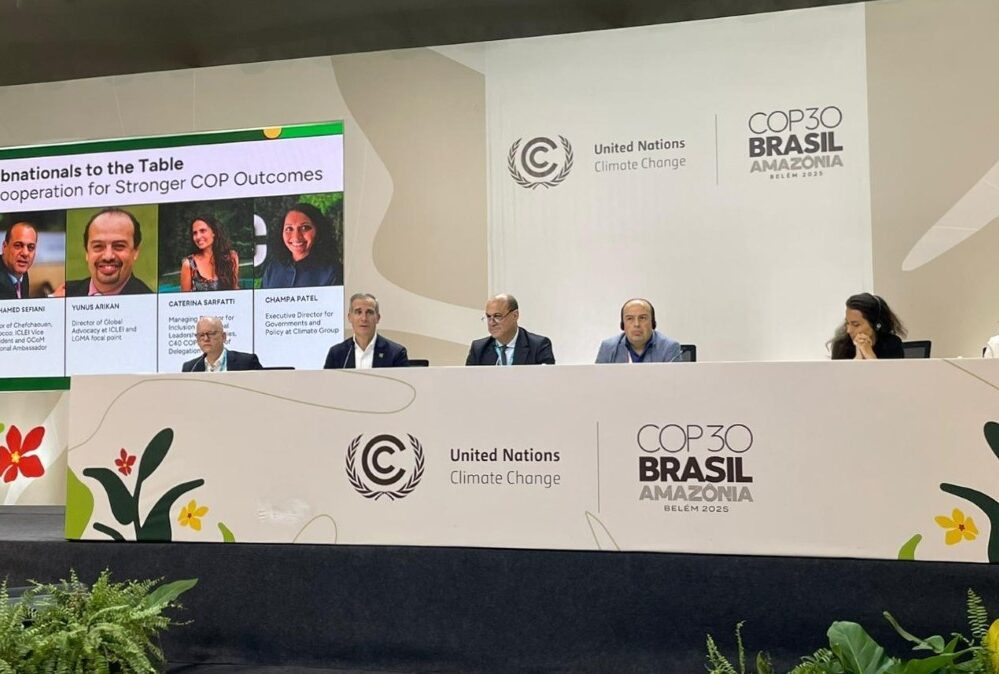We breathed a sigh of relief upon COP30’s conclusion – global multilateral consensus on climate change can still be achieved. A failure to come to agreement at such a fraught moment for global cooperation would have been a disastrous outcome. We cheered the passage and promise of key outcomes on the just transition and the promise of the COP30 Presidency-led fossil fuel transition and deforestation roadmaps.
However, an agreement that only slightly moves the dial forward on climate is a deal that does not acknowledge the truth of the urgency of our situation.
Leaders of our towns, cities, regions and states around the world are acknowledging this urgency and are moving to act. By failing to bring cities, states and regions to the negotiating table in a formal framework, COP30 missed the opportunity to harness the power of this broad implementation and bring it to scale.
Throughout COP30, the COP Presidency, Brazil’s leadership and leaders in many Parties, recognized and commended the bold, ambitious climate action happening at the local level. We heard the importance of multilevel governance and urbanization, not only in the negotiating halls, but also in the Action Agenda spaces. We commend and support the outcomes of the fourth Ministerial Meeting on Urbanization and Climate Change. And the outcome text of the Mutirão Decision reaffirms that sentiment by welcoming “the efforts of all non-Party stakeholders in addressing and responding to climate change, including … cities and other subnational authorities in multilevel climate action.”
The local and regional governments that make up the network of ICLEI are united in a mission towards urban sustainability. ICLEI’s five pathways towards sustainable development – equitable development, zero emission development, nature-based development, circular development and resilient development – guides their journey, and our overall goal is to significantly scale up and expand the commitments of local and regional governments to create sustainable, resilient, inclusive and safe cities, towns and regions around the world.
What COP30 showed us is that the path to scaling local and subnational action on climate will not only pass through the plenary halls of COP.
The climate action the world needs can start in our town halls, as the Town Hall COP initiative showed this year. This initiative resulted in more than 50 communities holding local climate summits to connect climate action at all levels. These Town Hall COPs engaged nearly 15,000 residents in the process, showing that multilevel climate action is not limited to a two-week period each year.
The climate action the world needs can start at the meeting tables of our cities, where ambitious road maps to phase out fossil fuels are already being planned, based on renewables, sustainable energy sources, circular and just local economies. For cities and regions, fossil fuel phase-out is not only a climate imperative, it is a governance, equity, and public resilience imperative. A future fossil fuel roadmap must recognize that the transition will be implemented locally, shaped by community needs, and driven through integrated planning, electrification, energy efficiency, and nature-based and fair solutions. We need national ambition, enabling frameworks, finance and multilevel cooperation to meet our action to accelerate this transformation.
The climate action the world needs can happen during regional climate weeks, mid-year climate talks, and the year-round advocacy undertaken by the Local Governments and Municipal Authorities (LGMA) Constituency. ICLEI serves as the focal point for the LGMA, one of the nine official Constituencies within the UNFCCC. This role is a special one that demands deep partnership and collaboration from all networks involved. This year, under ICLEI’s coordination, the LGMA COP30 Joint Position was endorsed by more than 50 local and regional government networks, representing tens of thousands of local and regional governments around the world. The LGMA also developed and released a guidance document for negotiators and a Compendium of National Mobilization Strategies to aid Parties throughout the year.
The climate action the world needs can start on the islands of the Pacific through the pre-COP, as we look towards Australia’s COP31 negotiations leadership and Türkiye’s COP31 presidency. As COP30 in Belém opened the world’s eyes to the plight and power of the Amazon, we hope that COP31 can keep its promise to bring global attention to the regions most vulnerable to the impacts of climate change such as Oceania’s Pacific Islands and vulnerable Mediterranean ecosystems.
The multilevel climate action the world needs can scale up in Africa, as we look forward to COP32 in Addis Ababa in 2027, as Ethiopia has agreed to host the first COP in a Least Developed Country. That same year the IPCC Special Report on Cities in 2027 will be presented to the UNFCCC, and we hope its outcomes will help to guide deeper collaboration with local and other subnational governments.
The climate action the world needs can come from national capitals as well. Seventy-seven nations and the EU have endorsed the Coalition for High Ambition Multilevel Partnerships (CHAMP) for Climate Action, and we welcome the COP30 announcement of Brazil and Germany as the CHAMP co-chairs. We support this national engagement effort, and invite further collaboration and development on multilevel action at next year’s Daring Cities.
And the climate action the world needs can continue with Brazil, after this Amazonian COP. Brazil’s own stance on climate federalism, as described in their NDC, makes this Presidency a credible advocate for local and other subnational governments, and we hope they will continue to show leadership in their inclusion of all levels throughout the rest of their presidency.
The local and regional governments of the ICLEI network are taking the climate actions the world needs. Now the world needs the COP process to step up and support us.
Signed,
Members from the ICLEI network who were represented at COP30, including:
Katrin Stjernfeldt Jammeh, Mayor, Malmö, Sweden, and ICLEI President
Mohamed Sefiani, Mayor, Chefchaouen, Morocco, and ICLEI Vice President
Gino Van Begin, ICLEI Secretary General
Moira Were, Mayor, Onkaparinga, Australia, and ICLEI Oceania Regional Executive Committee member and Global Executive Committee representative
Gi-myoung Jung, Mayor, Yeosu, Korea
Guille López, Councilor, Barcelona Metropolitan Area, Spain
Raymond Kinyua, County Executive Committee Member for Climate Change, Embu County, Kenya
Justus Kinywa Mugo, Deputy Governor, Embu County, Kenya
Sunyoung Park, Director of Environment Policy Division, Pohang, Korea
Kenalemang Rose Phukuntsi, Mayor, Tswelopele, South Africa
Éric Piolle, Mayor, Grenoble, France




